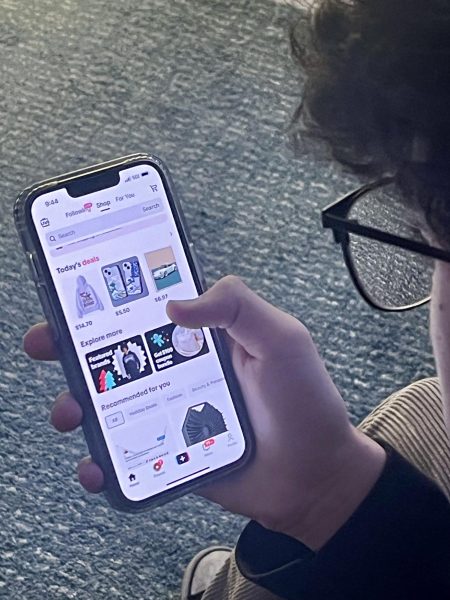The Latest Addiction- Cell Phones
SBHS Teens just can’t put their phones down.
April 17, 2019
Panic. Sweaty palms. Shaking. Freaking out. Typical behavior of a drug addict without their drugs.
Panic. Sweaty palms. Shaking. Freaking out. Typical behavior of teen without their phone. More and more, teens feel like they can’t live without them.
SBHS junior Briana Ferro considers herself to have a phone addiction because of the excessive amount of time she spends on her cellular device and online.
“I use my phone for hours and it’s a part of my daily routine,” said Ferro, ” I always use it at school, right when I get home, before I go to sleep, and after I wake up.”
Teens all around the world spend more and more of their day staring at tiny, glowing screens and becoming obsessed with social media, online videos, and communicating with friends.
A 2016 survey by Common Sense Media showed that 50% of the teenagers surveyed felt addicted to their phones, 78% of them checked their phones every hour, and 72% of them felt pressured to respond to texts and social media notifications immediately.
When teens are so focused on what’s on their phones, they often tend to lose connections with people in real life and fail to have social interactions in person.
Dr. David Greenfield, a technology expert who has studied cell phone addiction, calls smartphones the “world’s smallest slot machine”.
Greenfield says “every so often, the cell phone gives you a reward. These rewards in the form of emails, text messages or other updates. These rewards are surprises, and you don’t much about them before they arrive. They may be filled with great news, much like a slot machine will often deliver a jackpot.”
For someone with a phone addiction, dopamine releases become frequent when these rewards are present, and cell phone addicts crave these releases so much that they are incapable of thinking about anything else.
Valery Lenti, a junior at South Broward High School, spends nine hours on her phone almost every day. The majority of that time, she spends on Instagram and communicating with friends.
“I only spend time away from my phone when I go to sleep,” said Lenti, “I consider myself to have a phone addiction because the amount of time I spend on my phone is unhealthy.”
Cell phones are not only taking over the lives of the younger generation, but they’re taking over everyone’s lives in this society by pulling them further away from the real world to focus on a screen. This is a serious issue that correlates with phone addiction and it is causing people to replace family, friends, relationships, connections, and emotions with their cellular device.














